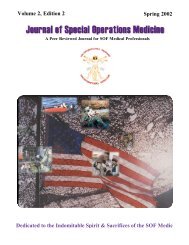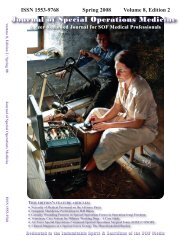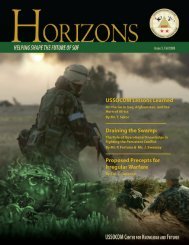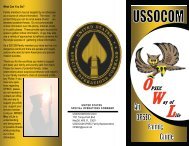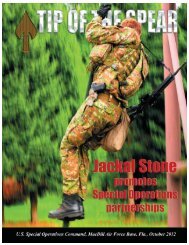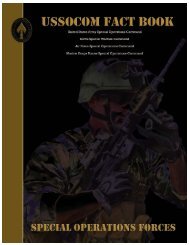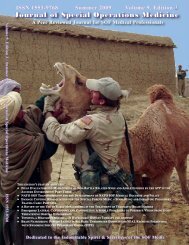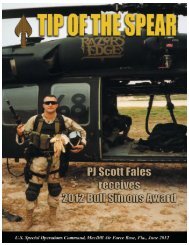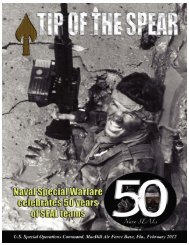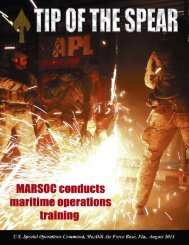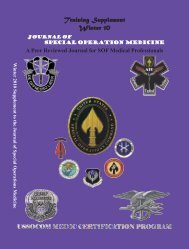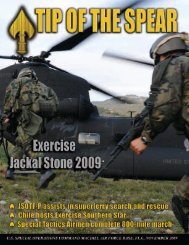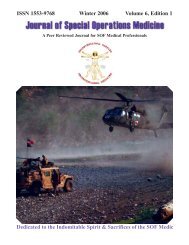October 2011 - United States Special Operations Command
October 2011 - United States Special Operations Command
October 2011 - United States Special Operations Command
Create successful ePaper yourself
Turn your PDF publications into a flip-book with our unique Google optimized e-Paper software.
the self-induced time away, such as some schools that may<br />
not really be necessary. Some of the things that we're<br />
looking at are how to better train in certain locations or<br />
minimize the amount of time you have to be away from<br />
home in order to train. We're trying to reduce those sorts of<br />
things, to better manage time away from home.”<br />
While on the subject of time, Navy Adm.William<br />
McRaven, USSOCOM commander, said during his<br />
confirmation hearings that such deployment tempos had an<br />
impact on SOF personnel attending cultural and language<br />
training.<br />
“For SOF forces, it’s absolutely imperative that we<br />
continue to maintain and better ourselves in our cultural and<br />
language abilities,” Smith said. “For many SOF qualification<br />
courses, cultural and language training is embedded into it.<br />
We are a force that works and operates by, through and with,<br />
our partner nations out there. It is extremely important to<br />
understand and respect other cultures and to at least attempt<br />
to speak the language.”<br />
Just as he and his fellow senior NCOs have had to<br />
operate in a world much different from the one they first<br />
trained in, Smith first saw the need for a separate SOF<br />
senior enlisted academy to focus on irregular warfare nearly<br />
five years ago.<br />
Today, the Joint <strong>Special</strong> <strong>Operations</strong> Forces Senior<br />
Enlisted Academy at MacDill Air Force Base educates SOF<br />
and selected conventional force senior enlisted personnel in<br />
mission-oriented leadership and critical thinking skills to<br />
prepare them to effectively advise, lead and mentor in the<br />
future operations environment (joint, combined, interagency)<br />
at the operational and strategic levels, according to the Joint<br />
<strong>Special</strong> <strong>Operations</strong> University website.<br />
“I would say of my entire career and what was my<br />
biggest contribution, I would hope that it was to better<br />
educate our fellow senior enlisted warrior diplomats and<br />
having implemented that plan,” Smith said.<br />
While expressions like “tip of the spear” and “quiet<br />
professionals” may designate Soldiers, Airmen, Sailors and<br />
Marines as being one of USSOCOM's ranks, Smith said<br />
such terminologies have never meant as much to him as the<br />
actual qualities they display.<br />
“To be SOF means to be competent, wise and<br />
understanding of the environment you’re operating in,” he<br />
said. “It means understanding who the enemy is and who the<br />
friendlies are. It means understanding the difference and<br />
balance between kinetic operations and non-kinetic<br />
operations. It means understanding what tools to apply to a<br />
situation to achieve the desired outcome. That’s what<br />
distinguishes SOF from all the other forces.”<br />
As he prepares for his retirement from the Army, Smith<br />
also shared how he developed his leadership vision and<br />
managerial philosophy throughout the years.<br />
“I think deep down in every operator’s heart and<br />
memory is the time that he spent on a team,” he said.<br />
“Those were probably some of the best of times, but I had to<br />
start moving through the ranks and leave that world behind.<br />
Then you start looking forward to other challenges and how<br />
you can best serve in the role.”<br />
But even as he retires, Smith remarked how some core<br />
values of the SOF and conventional military forces have<br />
always remained constant, despite the speed-of-light<br />
advances in technology.<br />
“A lot of people talk about how we have the greatest<br />
force that we’ve ever had,” Smith said. “I don’t necessarily<br />
agree with that. Our force today is just as good as the men<br />
who have served before them. One thing that has absolutely<br />
not changed is the willingness of each generation in our<br />
country to stand up and meet the demands of securing our<br />
freedom and protecting our interests.”<br />
Adm. Bill H. McRaven, commander U.S. <strong>Special</strong><br />
<strong>Operations</strong> <strong>Command</strong>, passes the sword to <strong>Command</strong><br />
Sgt. Major Chris Faris during a change of responsibility<br />
ceremony Sept. 27, at the command’s headquarters on<br />
MacDill Air Force Base, Fla. The transfer of the sword<br />
from Adm. McRaven to <strong>Command</strong> Sgt. Major Faris<br />
signifies the trust and confidence that USSOCOM has in<br />
the non-commissioned officer corps. Faris becomes the<br />
USSOCOM’s seventh <strong>Command</strong> Sgt. Major and replaced<br />
<strong>Command</strong> Sgt. Major Thomas H. Smith. Faris is the<br />
personal adviser to the commander on all issues<br />
regarding the welfare, readiness, morale, and proper<br />
utilization of the enlisted force. Photo by Mike Bottoms.<br />
Tip of the Spear<br />
31



